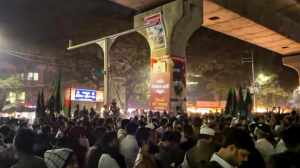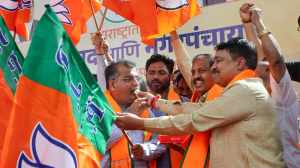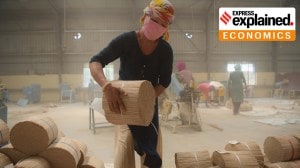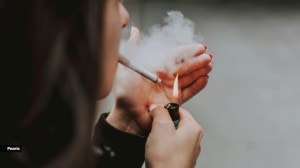Humara value thoda badha hai: At Bru camp, a new hope, a swing towards Motha
For the first time, the migrants have voting rights in Tripura polls; BJP ally IPFT, which is contesting from Kanchanpur, is hoping to ride support for Modi govt stemming from this
 Known as Reangs in Tripura, the Brus fled their homeland after a bruising conflict with the dominant Mizos. (Express Photo)
Known as Reangs in Tripura, the Brus fled their homeland after a bruising conflict with the dominant Mizos. (Express Photo) For over two decades, time stood still at Naisingpara, the largest relief camp in Tripura for families of the Bru community who had to flee Mizoram in 1997 due to ethnic violence.
Twenty-six years on, electricity connection, water supply, toilets – the bare necessities to lead a dignified life – continue to elude the nearly 40,000 Brus staying at the camp, which overlooks Jampui, the highest hill range in Tripura, bordering Mizoram.
“But there has been one change. We have voting rights in Tripura now,” says Lalfakawmi Bru, a single mother of five.
Known as Reangs in Tripura, the Brus fled their homeland after a bruising conflict with the dominant Mizos. For long, all efforts to resettle them failed as Tripura insisted that the families be repatriated.
 So far, around 14,000 displaced Brus have been granted voting rights in Tripura. (Express Photo)
So far, around 14,000 displaced Brus have been granted voting rights in Tripura. (Express Photo)
Lalfakawmi says there is no question of going back to Mizoram. “The past continues to haunt us… Many of our ancestors are also buried in this land. This is our home now.”
The Tripura government formally endorsed the demand to allow resettlement of the Brus in the state for the first time in November 2019, soon after TIPRA Motha leader Pradyot Debbarma wrote to the Centre in this connection.
In January 2020 finally, there was a four-way agreement to resettle them in Tripura, between the state, Mizoram, the Bru leaders, and the Centre. While the execution of the “permanent solution”, the term used by the Centre to describe the agreement, is far from complete, for the community, obtaining the right to vote under the pact has ignited hopes for a better future.
So far, around 14,000 displaced Brus have been granted voting rights in Tripura.
“Humara value thoda badha hai (our value has risen a little),” says Chakbela Meska, a local community leader, pointing at an under-construction water tank, a half-built electricity transformer, and masons building pucca houses in the vicinity, projects launched following the agreement.
The pact makes every eligible displaced family entitled to plots of land measuring 40 feet by 30 feet, and a fixed deposit of Rs 4 lakh plus Rs 1.5 lakh in four instalments to construct a house. Apart from Naisingpara, families at relief camps in Asha Para, Hazacherra, Naisau Para, Kaskau Para, Khakchang Para and Hamsa Para are being resettled in designated land parcels across Tripura.
“More importantly, politicians are visiting us now. They rarely entered the camp before. We did not matter to them. That has changed with the granting of voting rights,” says Govind Msha of the Bru Displaced Youth Association.
So far, while the displaced Brus could not vote in elections in Tripura, their names featured in the electoral rolls of Mizoram. Every time there was an election in Mizoram, polling booths would come up at the Tripura-Mizoram border to enable the displaced Brus to exercise their franchise.
Meska laments that it took a deadly inferno, which gutted the entire camp in March 2011 and claimed 16 lives, for then Tripura Chief Minister Manik Sarkar to visit for the first time. But now, leaders are making a beeline for the camp, home to over 2,000 families, many of them displaced from districts in Mizoram such as Mamit and Kolasib.
Located 20 km away from the nearest sub-divisional town Kanchanpur and 190 km from the state capital Agartala, Naisingpara falls under the Kanchanpur ST-reserved Assembly constituency. The CPI(M) won the seat five consecutive times between 1993 and 2013, but enjoys very little traction among the Brus now.
Kanchanpur is among the five seats the BJP has left for its tribal ally IPFT. With the BJP’s role in the Bru settlement surging its popularity, the IPFT hopes to ride on the same as well as on its own pockets of influence.
The party that has the clearest edge is the TIPRA Motha. Its chief and royal scion Pradyot was at the Naisingpara camp Sunday. Addressing a group huddled around him to take selfies, he said: “Remember that thansa (unity) includes each and every person living in this state.”
Apart from Pradyot’s advocacy of their cause, the Motha’s ascendance as a force in the hills of Tripura and among the tribals has also rubbed off on the Brus, who are classified as a “particularly vulnerable tribal group”.
Govind, of the displaced youth association, says: “We like the BJP, but we will support those who are willing to die for us. When an agreement was signed to send us back to Mizoram, it was habagra (king in Bru language) who stepped in. When we told him we don’t want to go back, he ensured that we resettle in Tripura itself. There is no one like him.”
However, there are still miles to go, with the Bru resettlement drawing resistance from certain quarters such as the Bengali-led Nagaraik Suraksha Manch and the Mizo Convention, which claim this will lead to resource crunch and demographic imbalance.
Laldawngliana, who acts as a conduit between the Naisingpara families and the local administration, claims many developmental projects which were started after the agreement was signed have come to a standstill now. “They cite the model code of conduct, but these projects were approved much before the elections. Even the daily allowance of Rs 5 per person has not been given since January last year. Distribution of rice has become irregular,” he complains.
Still, many feel that, with the granting of voting rights, a fundamental shift has taken place. “All these years the society made us feel unwanted. It was hurtful. We wanted to scream that we are also Indians. We hope the society will treat our children with dignity,” says Meska.
- 01
- 02
- 03
- 04
- 05































